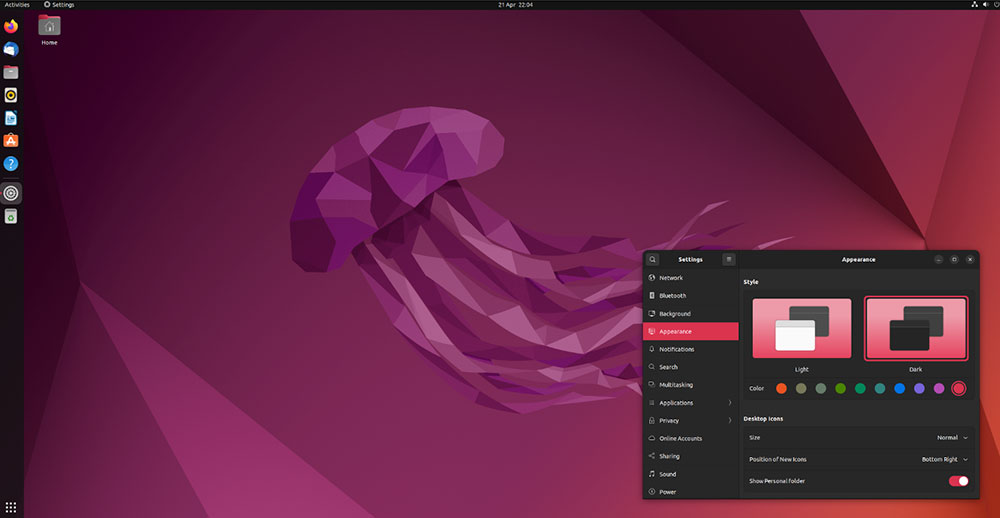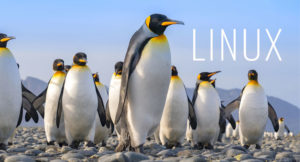Canonical’s Ubuntu 22.04 LTS, aka “Jammy Jellyfish,” is now generally available with features that raise the bar for open source — from cloud, to edge, to IoT and workstations.
The desktop version is one of the biggest LTS releases from Ubuntu with respect to visual and feature changes. This major upgrade to GNOME 42 brings changes to the desktop itself in terms of layout, appearance, and how things work.
If the Ubuntu desktop is your only connection to Canonical’s infrastructure, you can expect some mild and minor hands-on adjustments. If you deal with the rest of Ubuntu’s enterprise world, you will find a lot more hardcore improvements in security and performance for IoT and cloud computing connections.
Canonical announced the new release on Thursday, detailing features that bring significant leaps forward in cloud confidential computing, real-time kernel for industrial applications, and enterprise Active Directory, PCI-DSS, HIPAA, FIPS, and FedRAMP compliance.
The new desktop release, however, comes without the anticipated new installer, which uses flutter, an open-source user interface, noted Oliver Smith, Canonical’s program manager for the Ubuntu desktop. The flutter element is not fully ready for deployment. Instead, Canonical will release a build of 22.04 that does feature the new installer later in the update cycle.
“I think when you are dealing with something that we want to support for five years, and we were expecting a huge amount of adoption, we just did not feel that we would have the opportunity to test across all the different sort of ranges of hardware and use cases that we wanted to get (for) confidence to go live out of the box,” Smith explained.
“It is evolving a lot in the background, but just the timing did not quite work out for this release.”
Ubuntu Desktop Still in Focus
The range of use cases that involve Ubuntu Server, IoT, and cloud OS installations, is not making the Ubuntu desktop edition less significant, according to Mark Shuttleworth, CEO of Canonical. He denied the Ubuntu desktop itself is less important now than other enterprise factors in response to a reporter’s question Tuesday during a virtual presentation.
“Our mission is to be a secure, reliable, and consistent open-source platform everywhere,” he said. “Ubuntu 22.04 LTS unlocks innovation for industries with demanding infrastructure security requirements, such as telecommunications and industrial automation, underpinning their digital transformation.”
So the desktop is sort of central to Ubuntu’s narrative, Shuttleworth added. It is also central to the kind of innovation work a lot of the company’s developers do within Intel.
“For example, [improvements] enable the same sorts of high-end capabilities whether those are battery life or performance capabilities on Linux that they achieve on platforms like Windows,” he said. “Those are really important.”
In terms of resources, Canonical has about 60 people working with its various partners — Dell, HP, Lenovo — and the industry supply chain on the desktop. Plus, another 20 engineers or so work on core desktop capabilities, he noted.
Ubuntu Adoption Grows Deep
Ubuntu is deeply integrated into public clouds and optimized for performance, security, and ease of use. A key new capability is confidential computing, which greatly improves data protection and privacy in leading public clouds without requiring any changes to existing application deployments.
Ubuntu is the only Linux distribution supporting Azure confidential VMs, according to Vikas Bhatia, head of product for Azure Confidential Computing at Canonical. To ensure great performance on Arm, Canonical also optimized Ubuntu 22.04 LTS images for AWS Graviton.
On AWS, Ubuntu is available from EC2, with multiple images including support for the latest Graviton chips, all the way to containers. This includes the latest Arm servers, Ampere A1, that provide high-performing and cost-effective solutions for all types of workloads, he said.
Other Major Ubuntu Plaudits
Innovators on Raspberry Pi get the first long-term support release with Ubuntu Desktop support on the Raspberry Pi 4. The entire recent Raspberry Pi device portfolio is supported for the very first time, from the new Raspberry Pi Zero 2W to the Raspberry Pi 4, said Eben Upton, CEO of Raspberry Pi Trading.
“It is great to see a certified Ubuntu Desktop release that includes support for the 2 GB Raspberry Pi 4, giving developers all over the world access to the most affordable development desktop environment,” he said.
Ubuntu WSL (Windows Subsystem for Linux) delivers deep integration with native Windows development environments like Visual Studio Code and Docker Desktop across a shared file system. Users mix Windows and Linux commands to create efficient workflows for data science, web development, and IT systems management. Users of Ubuntu WSL can upgrade to 22.04 LTS directly.
For Windows and macOS developers, Multipass provides Ubuntu 22.04 LTS VMs on-demand with full cloud-init for cloud prototyping at home. Multipass gains Apple M1 support, making it the best way to drive development for new ARM cloud instances, according to Canonical. Multipass has also added support for Docker workflows to unify the developer experience for cloud and cloud-native applications.
For shared development environments, multi-user LXD offers per-user project segregation. This addition restricts specific user permissions so multiple people can safely share the same LXD cluster.
Foundation for Data-Sensitive Workloads
Ubuntu is the platform of choice to run Microsoft SQL Server on Azure with enterprise-grade support, noted Canonical. SQL Server on Ubuntu Pro LTS for Azure offers scalability and performance.
It also gives business-critical SQL Server workloads access to comprehensive open-source security on Azure. Nvidia virtual GPU (vGPU) software drivers are generally available now.
Data scientists can natively install Nvidia vGPU Software 14.0 and benefit from highly-performant GPU resources across multiple virtual machines simultaneously. This allows data scientists to use parallel, isolated advanced AI/ML workloads to help ensure that the underlying hardware resources are used efficiently.
“Enterprises, data scientists and developers building AI solutions require integrated systems and software that easily support MLOps workflows,” said Manuvir Das, vice president of Enterprise Computing at Nvidia.
“Organizations can now run Nvidia AI on Ubuntu to help solve some of humanity’s biggest challenges with new products and systems that simplify operations, boost safety, and improve communication,” Das added.
Other Ubuntu Strengths
The Ubuntu 22.04 LTS base image is available on Docker Hub along with a Canonical-maintained portfolio of secure and stable LTS application container images. Existing LTS Docker images on Ubuntu will receive new long-term supported 22.04-based tracks.
These include MySQL, PostgreSQL, and Nginx. The open-source applications portfolio is expanding further, focusing on Observability and Big Data, with new Grafana Loki, Apache Kafka, and Apache Cassandra container images.
“Ubuntu plays an essential role on Docker Hub, as one of the most popular Docker Official Images,” said Webb Stevens, senior vice president of Secure Software Supply chain at Docker.
Real-Time Kernel, Too
Canonical also reported that the Ubuntu 22.04 LTS real-time kernel is available in beta.
Designed to meet telco network transformation needs for 5G, the real-time kernel delivers performance, guaranteed ultra-low latency, and security for critical infrastructure. This new kernel also serves latency-sensitive use cases in industrial automation and robotics. It handles real-time applications like Cloud RAN,” said Dan Lynch, marketing director at Intel.
“The real-time kernel in Ubuntu 22.04 LTS leverages the acceleration from Intel hardware, allowing us to compete on even terms with the biggest network equipment providers,” said Radoslaw Adamczyk, technical lead at IS-Wireless, which develops and delivers mobile networks in the OpenRAN model.
That offers the ability to have one platform for the whole stack, from bare metal with MaaS to Ubuntu OS, LXD VM and Microk8s on the edge. Ubuntu 22.04 LTS adds Rust for memory-safe systems-level programming. It also moves to OpenSSL v3, with new cryptographic algorithms for elevated security.
Desktop Highlights
Ubuntu’s default GNOME desktop gains significant usability, battery, and performance improvements with the GNOME 42 upgrade featuring GNOME power profiles and streamlined workspace transitions alongside significant optimizations which can double the desktop frame rate on Intel and Raspberry Pi graphics drivers.
GNOME 42 brings a horizontal workspace view alongside the horizontal application view. The changes in will require some muscle memory changes to get used to updated and new applications.
Expect lots of new looks. Some of the notable upgrades involve changes to the base color scheme and the Jammy Jellyfish default wallpaper.
File Manager has a more compact look, and new screenshot tools changes how you do captures.
Available for Download
Ubuntu 22.04 LTS Jammy Jellyfish is available now on Ubuntu Downloads and major public clouds.
























































